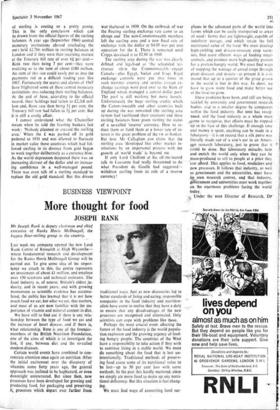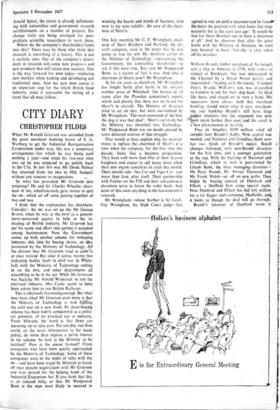More thought for food
BUSINESS VIEWPOINT JOSEPH RANK
Mr Joseph Rank is deputy chairman and chief executive of Ranks Hovis McDougall, the biggest flour-milling group in the country.
Last week my company opened the new Lord Rank Centre of Research at High Wycombe--- wherefundamental research and development for the Ranks Hovis McDougall Group will be carried out. To give some idea of the impor- tance we attach to this, the centre represents an investment of about £1 million, and employs over 150 scientists and technical assistants. The food industry is, of course, Britain's oldest _in- dustry, and in recent years, and with growing momentum as scientific evidence has accumu- lated, the public has learned that it is not how much food we eat, but what we eat, that matters, and most of us are now familiar with the im- portance of vitamin and mineral content in diet.
We have still to find out if there is any rela- tionship between the type of food we eat and the increase of heart disease, and if there is, what relationship. Rum is one of the founder- members Of the British Nutrition Foundation, one of the aims of which is to investigate the link, if any, between diet and the so-called modern diseases.
Certain world events have combined to con- centrate attention once again on nutrition. After the initial excitement over the discovery of vitamins some forty years ago, the general approach was inclined to be haphazard, or even downright uninterested. But since then, new processes have been developed for growing and producing food, for packaging and preserving it, processes which depart ever furthei from
traditional ways. Just as new discoveries led to better standards of living and eating, responsible companies in the food industry and nutrition- alists have come to realise that they have a duty to ensure that any disadvantages of the new processes are recognised and eliminated. Only scientists can cope with problems like these.
Perhaps the most crucial event affecting the future of the food industry is the world popula- tion explosion and the growing urgency of feed- ing hungry people. The countries of the West have a responsibility to take action if they wish to continue living in a stable world. We must do something about the food that is lost un- intentionally. Traditional methods of preserv- ing food cause some of its nutritional value to be lost—up to 50 per cent loss with some methods. In the past this hardly mattered, since we simply ate more food to make up any nutri- tional deficiency. But this situation is fast chang- ing.
We must find ways of converting food sur-
pluses in the advanced parts of the world into forms which can be easily transported to areas of need: forms that are lightweight, capable of indefinite storage, and which retain the full nutritional value of the food. We must develop high-yielding and disease-resistant crop varie- ties, find more efficient ways of feeding meat- animals, and produce more high-quality protein for a protein-hungry world. We must find ways of stopping the wastage of cereal crops through plant diseases and insects—at present it is esti- mated that up to a quarter of the grain grown in the world is lost in this way. In short, we have to grow more food and make better use of the food we grow.
These problems have been, and still are being, tackled by university and government research bodies, and to a smaller degree by companies within the food industry. But RHM has recog- nised. and the food industry as a whole must ,dome to recognise, that efforts must be stepped up in the "face of this challenge. If enough time and money is spent, anything can be made in a laboratory—it is on record that a silk purse was literally made out of a sow's ear in an Ameri- qin research laboratory, just to prove that it + could be done. But laboratory miracles help and enrich the world only when they can be mass-produced to sell to people at a price they can afford. This applies to food, medicines and new processes. It follows that industry, as well as government and the universities, must have ita own research centres, and that industry. Orernrment and universities must work together on the enormous problems facing the world today.
Under the Rum Director of Research, Div
'Arnold Spicer, the centre is already collaborat- ing with universities and government research establishments on a number of projects. Ex- change visits are being arranged for post- graduate scientific researchers to work there.
Where do the company's shareholderecome into this? There may be those who think that research is something of a luxury. This is not a realistic view. Out of the company's invest- ment in research will come new processes and new products that will create new markets. This is the way forward for RHM today—exploring new markets while holding and developing our traditional ones. And the new REIM centre is an important step for the whole British food industry, since it represents the setting of a trend that all must follow.











































 Previous page
Previous page